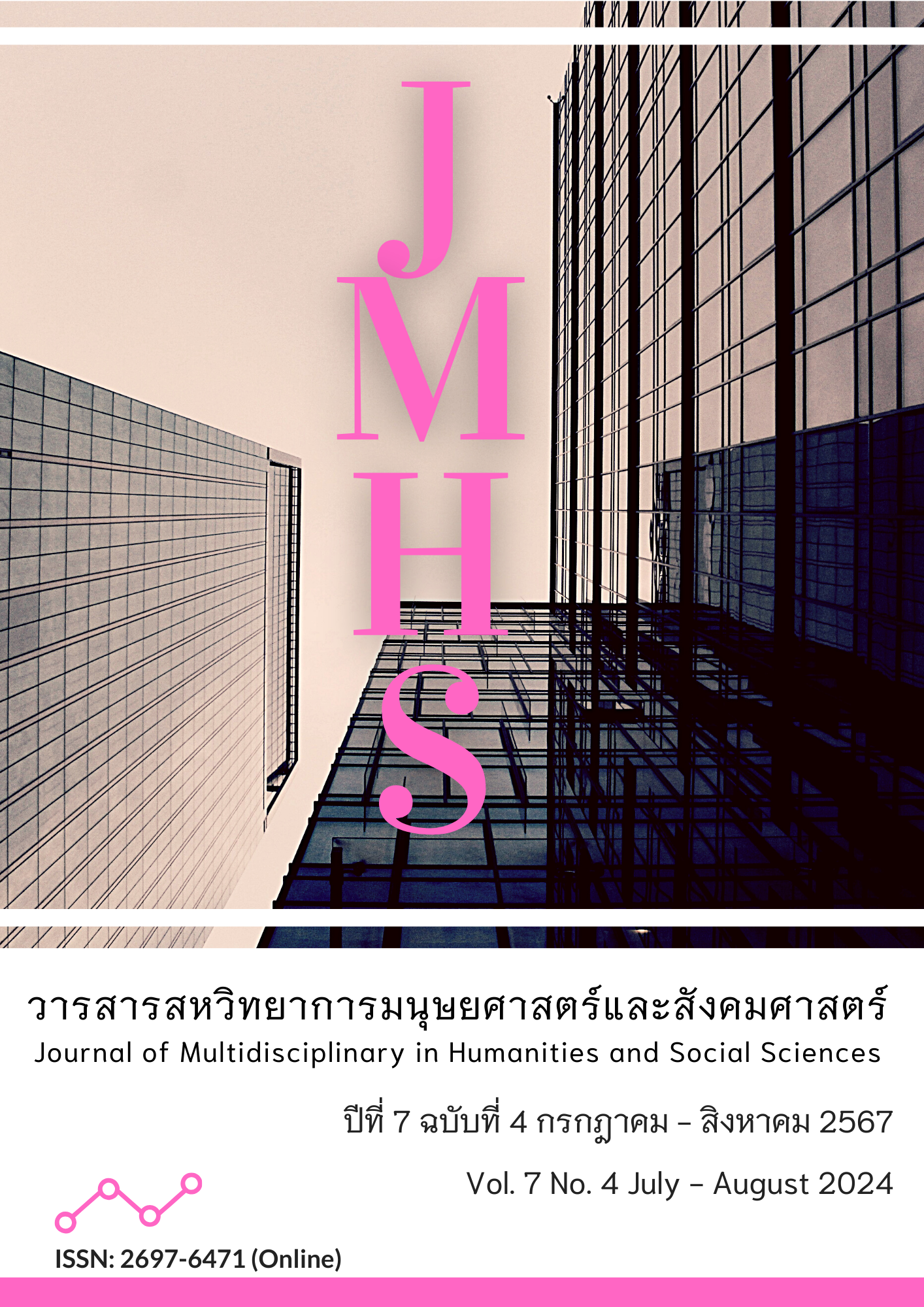The Model of Modern Management Influencing Sustainable Organization Development: A Case Study of Thai Smile Bus Company Limited
Main Article Content
Abstract
This article aimed to 1) study the model of modern management: strategic management, learning organization, and total quality management of Thai Smile Bus Company Limited; 2) study the level of sustainable organization development of Thai Smile Bus Company Limited; and 3) analyze the model of modern management influencing sustainable organization development of Thai Smile Bus Company Limited. This study was quantitative research. The researchers used the research questionnaire as an instrument to collect data. The questionnaires were distributed to 350 samples who are administrators and employees of Thai Smile Bus Company Limited. The statistics used in this study consisted of frequency, percentage, mean, standard deviation, and multiple regression analysis (MRA).
The research results were found as follows: 1) The model of modern management: Strategic management, learning organization, and total quality management of Thai Smile Bus Company Limited, in total, was at a high level; 2) Sustainable organization development of Thai Smile Bus Company Limited, in total, was at a high level; and 3) The model of modern management had an influence on sustainable organization development of Thai Smile Bus Company Limited at 77.0 Percent (Adjust R2 = .770), which can be ranked from higher to lower as follows: learning organization (Beta = .737, p < .01) strategic management (Beta = .342, p < .01) and total quality management (Beta = .245, p < .01) respectively. This research created a new body of knowledge about the model of modern management that has an influence on the sustainable organization development of Thai Smile Bus Company Limited, comprising of strategic management, learning organization, and total quality management.
Article Details

This work is licensed under a Creative Commons Attribution-NonCommercial-NoDerivatives 4.0 International License.
Views and opinions appearing in the Journal it is the responsibility of the author of the article, and does not constitute the view and responsibility of the editorial team.
References
กริชชัย ขาวจ้อย, วิไลพร วงษ์อินทร์ และ วิญญู พันธุ์โต. (2567). อิทธิพลของความยั่งยืนในฐานะตัวแปรส่งผ่านที่มีความสัมพันธ์ระหว่างการออกแบบผลิตภัณฑ์และต้นทุนการผลิตของผู้ประกอบการโอทอปในประเทศไทยที่ส่งผลต่อความพึงพอใจของลูกค้า. วารสารสหวิทยาการสังคมศาสตร์และมนุษยศาสตร์, 7(2), 824-844.
กรุงเทพธุรกิจ (2564, 21 กันยายน). “ไทย สมายล์บัส” ทุ่ม 2 พันล้าน เปิดตัวรถเมล์ไฟฟ้า เริ่ม ต.ค. นี้. สืบค้นเมื่อ 1 กรกฎาคม 2566, จาก https://www.bangkokbiznews.com/business/961312
บริษัท ไทย สมายล์ บัส (2566). Thai Smile Bus: Our Love Will Change the World รักเรา รักษ์โลก. สืบค้นเมื่อ 1 กรกฎาคม 2566, จาก https://thaismilebus.com
สุขุมพงศ์ ชาญนุวงศ์ และ บุญวดี มนตรีกุล ณ อยุธยา. (2560). การประยุกต์ใช้หลักธรรมาภิบาลที่ส่งผลต่อความยุติธรรมในองค์การ. วารสารการวิจัยเพื่อพัฒนาชุมชน, 10(3), 36-47.
Asif, M., Ali, S.U., Nour, O., Willander, M., Englund, U., & Elinder, F. (2010). Functionalized ZnO nanorod-based selective magnesium ion sensor for intracellular measurements. Biosensors and Bioelectronics, (26), 3, 1118-1123. http://dx.doi.org/10.1016/j.bios.2010.08.017
Bangbon, P., Channuwong, S., & Wang, K. (2024). A relationship between strategic human resource management and mission implementation of Thai Universities. Educational Administration: Theory and Practice, 30(5), 9041-9050.
Cascio, W.F. (2012). Managing human resources: Productivity, quality of life, profits. (9th ed.). New York: McGrew-Hill.
Channuwong, S., Sawangwong, B., Lamsutthis, V., Amnuaywuthikuk, J., & Khamsom, S. (2024). A relationship between organizational factors and good governance application of Thai Universities. Educational Administration: Theory and Practice, 30(4), 1729-1738.
Channuwong, S. (2018). The relationship between good governance principles and organizational justice: A case study of Bangkok Government Officials. Asia-Pacific Social Science Review, 18(3), 43-56.
Christofi, A., Christofi, P., & Seleshi S. (2012). Corporate sustainability: Historical development and reporting practices. Management Research Review, 35(2), 157-172. DOI:10.1108/01409171211195170
Coulter, M. K. (2010). Strategic management in action. Boston: Prentice Hall.
David, F. R. (2011). Strategic management: Concepts and cases. (13th ed.). Pearson.
Deming, W. E. (1982). Quality, productivity and competitive position. MIT-Center for Advanced Engineering Studies, Cambridge.
Elkington, J. (1994). Towards the sustainable corporation: Win-win-win business strategies for sustainable development. California Management Review, 36(2), 90-100. http://dx.doi.org/10.2307/41165746
French, W.L., & Bell, C.H. (1999). Organizational development: Behavioral science interventions for organizational improvement. New Jersey: Prentice Hall.
Hart, S., & Dowell, G. (2010). A natural-resource-based view of the firm: Fifteen years after, Journal of Management, 11(1), 65-87. DOI:10.1177/0149206310390219
Hyunkee, B., & Richard, S. S. (2011). Indicators of sustainable business practices. In Broniewicz, Elzbieta (2011) Environmental management in Practice. In Tech. Retrieved from http://www.intechopeen.com/articles/sjpw/title/sustainable-business-practices
Marquardt, M.J. (1996). Building the learning organization. New York: McGraw-Hill.
Marquardt, M.J. (2002). Building the learning organization: A systems approach to Quantum improvement and global success. New York: McGraw-Hill.
Marsick, V. (2006). Informal strategic learning in the workplace. Work-related Learning, 7, 51-69. DOI:10.1007/1-4020-3939-5_2
McGill, M. E., & Slocum. J. W. (1994). The smarter organization. New York: John Wiley & Sons.
Oakland, J, S., & Morris, P. (2011). Total quality management: A pictorial guide for managers. New York: Routledge.
Pearce, J. A., & Robinson, R. B. (2009). Strategic management: Formulation, implementation and Control. (11th ed.) Boston: McGraw-Hill.
Pedler, M., Burgoyne, J., & Boydell, T. (1991). The Learning company: A strategy for sustainable development. New York: McGraw-Hill.
Pettinger, B., & Richard, M. (2001). The learning organization. New York: John Willey & Sons.
Porter, M. E. (2011). “What is strategy” HBR’s 10 must reads on strategy. Boston: Harvard Business Review.
Saadat, V., & Saadat, Z. (2016). Organizational learning as a key role of organizational success. Procedia-Social and Behavioral Sciences, 230, 219-225. https://doi.org/10.1016/j.sbspro.2016.09.028
Senge, P. M. (1990). The fifth discipline: The art and practice of the learning organization. New York: McGraw-Hill.
Snongtaweeporn, T., Siribensanont, C., Kongsong, W., & Channuwong, S. (2020). Total quality management by using participation and teamwork. Journal of Arts Management, 4(3), 794-805. https://so02.tci-thaijo.org/index.php/jam/article/view/243921


